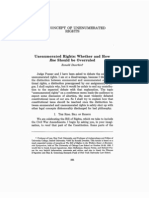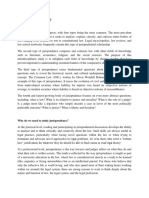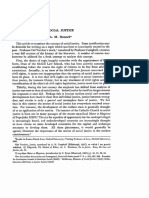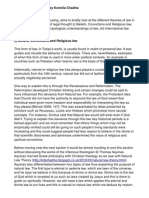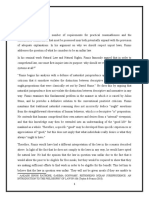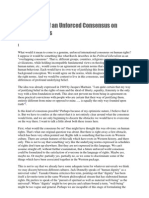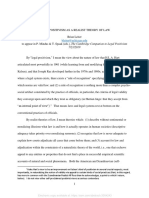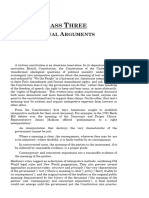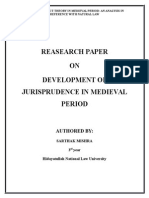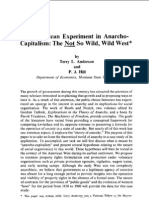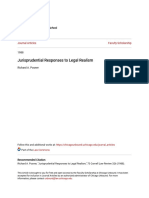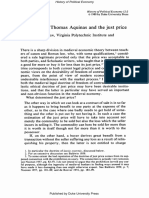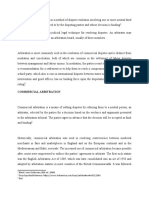A Positive Account of Property Rights - David Friedman PDF
A Positive Account of Property Rights - David Friedman PDF
Uploaded by
jm15yCopyright:
Available Formats
A Positive Account of Property Rights - David Friedman PDF
A Positive Account of Property Rights - David Friedman PDF
Uploaded by
jm15yOriginal Title
Copyright
Available Formats
Share this document
Did you find this document useful?
Is this content inappropriate?
Copyright:
Available Formats
A Positive Account of Property Rights - David Friedman PDF
A Positive Account of Property Rights - David Friedman PDF
Uploaded by
jm15yCopyright:
Available Formats
A POSITIVE ACCOUNT OF PROPERTY RIGHTS
BY DAVID FRIEDMAN
In thinking and talking about rights, including property rights, it seems
natural to put the argument in either moral or legal terms. From the former viewpoint, rights are part of a descriptidn of what actions are right
or wrong. The fact that I have a right to do something is an argument,
although not necessarily a sufficient argument, that someone who prevents me from doing it is acting wrongly.1
From the legal standpoint, rights are a description either of what the
law says or of how it is enforced. On the latter interpretation, "I have a
right to do X" translates as something like "If I do X the police will not
arrest me; if someone tries to stop me from doing X the police will arrest
him." 2 From this standpoint, one might claim that people in Holland
have the right to buy marijuana and that people in America have the right
to drive five miles per hour over the speed limit, even though both are
illegal.
Both of these approaches have serious difficulties if our goal is to
understand the phenomenon of rights, and associated phenomena, as
they actually exist in the real world. We frequently observe behavior
which looks like the claiming of rights and the recognition of rights in
contexts where neither a moral nor a legal account seems relevant.
Consider, for example, Great Britain's "right" to control Hong Kong,
Kowloon, and the New Territories. It is difficult to explain Communist
China's willingness to respect that right on moral grounds, given that,
from the Maoist standpoint, neither the government of Britain nor previous, non-Communist Chinese governments with which Britain had
signed agreements were entities entitled to any moral respect. It seems
equally difficult to explain it on legal grounds, given the general weakness of international law and the fact that for part of the period in question, Great Britain (as a member state of the United Nations) was at war
with China. An alternative explanationthat the Chinese government
believed that British occupation of Hong Kong was in its own interest
seems inconsistent with the Chinese failure to renew the lease on the
New Territories, due to expire in 1997.
A second example is presented by the 1982 Falklands war. On the face
of it, the clash looks like an attempted trespass repelled. Moral and legal
1
For a sophisticated discussion ofrightsfrom the standpoint of moral philosophy, see
Judith Jarvis Thomson, The Realm of Rights (Cambridge: Harvard University Press, 1990).
2
Or the equivalent in civil rather than criminal terms.
1994 Social Philosophy and Policy Foundation. Printed in the USA.
DAVID FRIEDMAN
accounts seem irrelevant, given the attitude of Argentina toward the British claim. Yet the willingness of Britain to accept costs far out of proportion to the value of the prize being fought over is difficult to explain
except on the theory that the British felt they were defending their property, which raises the question of what that concept means in such a
context.
A further difficulty with moral accounts of rights, in particular of property rights, is the degree to which the property rights that people actually respect seem to depend on facts that are morally irrelevant. This
difficulty presents itself in libertarian accounts of property as the problem
of initial acquisition. It is far from clear even in principle how unowned
resources such as land can become private property. Even if one accepts
an account, such as that of Locke, of how initial acquisition might justly
have occurred, that account provides little justification for the existing
pattern of property rights, given the high probability that any piece of
property has been unjustly seized at least once since it was first cleared.
Yet billions of people, now and in the past, base much of their behavior
on respect for property claims that seem either morally arbitrary or clearly
unjust.
A further difficulty with legal accounts of rights is that they are to some
degree circular. We observe that police will act in certain ways and that
their actions (and related actions by judges, juries, etc.) imply that certain
people have certain rights. But the behavior of police is itself in part a consequence of rightssuch as the right of the state to collect taxes and pay
them to the police as wages, and the property right that the police then
have over the money they receive.
For all of these reasons, I believe it is worth attempting a positive
account of rightsan account which is both amoral and alegal. In Section I of this essay, I present such an account-one in which rights, in
particular property rights, are a consequence of strategic behavior and
may exist with no moral or legal support.3 The account is presented both
3
The approach presented here is an extension of arguments made in my review of
Further Explorations in the Theory vf Anarchy, ed. Gordon Tullock (Blacksburg: University
Publications, 1974), published in Public Choice, vol. 25 (1976), pp. 101-4. Elements of the argument have also appeared in David Friedman, "Many, Few, OneSocial Harmony and the
Shrunken Choice Set," American Economic Review, vol. 70, no. 1 (March 1980), pp. 225-32.
A very similar approach is presented in Robert Sugden, The Economics of Rights, Co-operation,
and Welfare (Oxford: Blackwell, 1986). The chief difference between Sugden's discussion and
mine is that his argument is put primarily in terms of evolutionarily stable strategies, where
mine is put in terms of Schelling points. Sugden also provides interesting examples of the
same general line of argument in the work of eighteenth-century writers, in particular David
Hume.
Throughout most of this essay, I present the argument as the working out of my own
ideas. Readers familiar with the literature may feel, with some justice, that I fail to acknowledge how much of it has been said before by other people, often in somewhat different
terms. I have presented it in this form in part because I am trying to work out the logic of
a set of related ideas, not their history, and in part because that is how it in fact developed;
most of the material in Section I of this essay was first written down, and some of it first
published, more than fifteen years ago. I am grateful to the editors of this volume for providing an opportunity and incentive to compile and expand it.
A POSITIVE ACCOUNT OF PROPERTY RIGHTS
as an explanation of how rights could arise in a Hobbesian anarchy and
as an explanation of the nature of rights as we observe them around us.
In Section II, I suggest ways in which something like the present structure of rights might have developed.
One puzzling feature of rights as we observe them is the degree to
which the same conclusions seem to follow from very different assumptions. Thus, roughly similar structures of rights can be and are deduced
by libertarian philosophers trying to show what set of natural rights is just
and by economists trying to show what set of legal rules would be efficient. And the structures of rights that they deduce seem similar to those
observed in human behavior and embodied in the common law. In Section III, I try to suggest at least partial explanations for this triple coincidencethe apparent similarity among what is, what is just, and what is
efficient.
I. SCHELLING POINTS, SELF-ENFORCING CONTRACTS,
AND THE PARADOX OF ORDER
Several writers have tried to analyze the transition from a Hobbesian
state of nature to a state of civil order in terms of a set of hypothetical contracts establishing an initial distribution of property rights based on a preexisting distribution of power.4 One difficulty with this approach is that
in the initial situation there are no institutions to enforce contracts. How
can people in that situation change it by making contracts which are
unenforceable and thus of no effect?5
The same problem can be seen from the other side by asking in what
sense our society, or any society, is ever out of a Hobbesian state of
nature. What do we have, what have we created, that does not exist in
the Hobbesian jungle? Civil order is not defined by the existence of physical objectscourt rooms, police uniforms, law books. We can easily
enough imagine a Hobbesian junglein the middle of a war, say
coexisting with all the physical appurtenances of civil society; and primitive peoples, without court rooms or law books, nonetheless live in a
state of civil order.
Nor does it suffice to say that we are in a state of civil order because we
have judges to interpret our laws and police to enforce them. Why do
those people act in that way? Presumably because it is in their private
interest to do sojust as potential criminals obey the law for the same
reason. But that is how people act in the Hobbesian jungle. There too,
one man may happen to enforce a rule, and another happen to obey it,
4
1 would like to thank James Buchanan for bringing Schelling points to my attention and
Gordon Tullock for provoking me into exploring them further. See especially Winston Bush,
"Individual Welfare in Anarchy," in Explorations in the Tiieory of Anarchy, ed. Gordon Tullock (Blacksburg: University Publications, 1973).
5
This point is made by Gordon Tullock in "Corruption and Anarchy," in Tullock, ed.,
Further Explorations.
DAVID FRIEDMAN
because each finds it in his own interest to do so. What is it that we have
and the Hobbesian jungle does not have that makes it in the interest of
people to behave in a law-abiding and peaceful manner? To say that the
answer is "police, courts, government" only throws the question back a
step; if civil order is enforced by men with guns, what controls them?
There are two sorts of answers to these questions. One is that the difference is a moral one. People somehow accept an obligation, agree not
to behave according to simple self-interest, feel themselves bound by that
agreement, and alter their actions accordingly.
There are difficulties with this sort of explanation. First, there is the
empirical observation that people do not feel themselves bound to obey
laws; many, perhaps most, people feel free to violate those laws (speed
limits, drinking laws, customs regulations) which they disagree with and
believe they can get away with breaking. Second, to the extent that people do feel a moral obligation to obey social rules, it is hard to derive that
feeling from any variant of social-contract theory. The traditional variants
encounter the difficulty eloquently described by Lysander Spooner:6
since we ourselves did not sign the contract, we are not bound by it.
The difficulties with deriving moral obligation from the sort of pairwise
social contract suggested by Winston Bush7 are equally great. Even if we
consider that each of us is, at every instant, in an implicit contract with
each of his neighbors to respect some agreed-upon set of rights, still that
contract, in Bush's model, is based on the threat of coercion. It has no
more moral legitimacy, according to conventional moral ideas, than the
obligation to pay off a protection racket.
It may be possible to explain the difference between a Hobbesian state
of nature and civil society as a moral difference, but I prefer the alternative explanation-that the essential difference is not in the motivation of
the players but in the strategic situation they face. This raises the question of how making an agreementin a society with no mechanisms for
enforcing agreementscan change anything, the strategic situation
included.
A. The tool: Schelling points8
2,5,9,25,69,73,82,96,100,126,150
Two people are separately confronted with the list of numbers shown
above and offered a reward if they independently choose the same num6
Lysander Spooner, No Treason: No. VI, Tlie Constitution of No Authority (1870; reprint,
Larkspur, CO: Pine Tree Press, 1966).
7
Bush, "Individual Welfare in Anarchy."
8
Thomas C. Schelling, Vie Strategy of Conflict (Oxford: Oxford University Press, 1960),
ch. 3. While I am using Schelling's concept, my analysis of it, in particular my grounds for
applying it to games with communication, is somewhat different from his.
A POSITIVE ACCOUNT OF PROPERTY RIGHTS
ber. If the two are mathematicians, it isiikely that they will both choose
2the only even prime. Nonmathematicians are likely to choose 100
a number which seems, to the mathematicians, no more unique than the
other two exact squares. Illiterates might agree on 69, because of its peculiar symmetryas would, for a different reason, those whose interest in
numbers is more prurient than mathematical.
There are three things worth noting about this simple problem in coordination without communication. The first is that each pair of players is
looking for a number that is in some way unique. To a mathematician, all
three squares are special numbers, as are the three primes. But if they try
to coordinate on a square or a prime, they have only one chance in three
of successand besides, one may be trying primes and the other squares.
The number 2 is unique. If the set of numbers did not contain 2 but did
contain only one prime (or only one square, or one perfect number) they
would choose that.
The second thing to note is that there is no single right answer; the
number chosen by one player, and hence the number that ought to be
chosen by the other, depends on the categories that the person choosing
uses to classify the alternatives. The right strategy is to find some classification in terms of which there is a unique number, then choose that
numbera strategy whose implementation depends on the particular
classifications that pair of players uses. Thus, the right answer depends
on subjective characteristics of the players.
The third point, which follows from this, is that it is possible to succeed
in the game because of, not in spite of, the bounded rationality of the
players. To a mind of sufficient scope every number is unique.9 It is only
because the players are limited to a small number of the possible classification schemes for numbers, and because the two players may be limited to the same schemes, that a correct choice may exist. In this respect
the theory of this game is radically different from conventional game
theory, which assumes players with unlimited ability to examine alternatives and thus abstracts away from all subjective characteristics of the
players except those embodied in their utility functions.10
Consider now two players playing the game called bilateral monopoly.
They have a dollar to divide between them, provided they can agree on
9
There is a semi-serious theorem according to which all integers are interesting. The
proof is by induction. If some positive integers are uninteresting, then there must be a
smallest positive uninteresting integer. But this unique characteristic makes that number
interesting. So there can be no smallest uninteresting positive integer, so there can be no
uninteresting positive integers. Similarly, mutatis mutandis, for negative integers.
10
In practice, game theory sometimes smuggles subjective characteristics back into the
argument in the process of choosing a particular strategy set. A famous example of this problem is the analysis of oligopoly. The assumption that the firm's strategy is defined as a choice
of quantity and the assumption that it is defined as a choice of price lead to very different
conclusions. See David Friedman, Price Titeory: An Intermediate Text (Cincinnati: Southwestern Publishing Co., 1990), ch. 11.
DAVID FRIEDMAN
how to divide it. Superficially, there is no resemblance between this game
and the one discussed above; the players are free to talk with each other
as much as they want.
But while they can talk freely, there is a sense in which they cannot
communicate at all. It is in my interest to persuade you that I will only be
satisfied with a large fraction of the dollar; if I am really unwilling to
accept anything less than ninety cents, you are better off agreeing to
accept ten cents than holding out for more and getting nothing. Since it
is in the interest of each of us to persuade the other of his resolve, all
statements to that effect can be ignored; they would be made whether
true or not. What each player has to do is to guess what the other's real
demand is, what the fraction of the dollar is without which he will refuse
to agree. That cannot be communicated, simply because it pays each
player to lie about it. The situation is therefore similar to that in the previous game; the players must coordinate their demands (so that they add
up to a dollar) without communication. It seems likely that they will do
so by agreeing to split the dollar fifty-fifty.
The same points made about the previous game apply here, although
less obviously. The players are looking for a unique solution; if I decide
that the natural split is one-third/two-thirds, and you agree, both of us
reasoning from a mystic belief in the significance of the number three,
there is still the risk that each will decide he is entitled to the two-thirds.
To see that the solution depends on the particular categories used by
the players, imagine that both have been brought up to believe that utility, not money, is the relevant payoff, and suppose further that both
believe the marginal utility of a dollar to be inversely proportional to the
recipient's income. In that case, the solution to the game is not a fifty-fifty
split of money but a fifty-fifty split of utilityimplying a division of the
dollar into shares proportional to the two players' incomes.11
Such an outcome, chosen because of its uniqueness, is called a Schelling point, after Thomas Schelling who originated the idea. It provides a
possible solution to the problem of coordination without communication.
As this example shows, it js relevant both to situations where communication is physically impossible and to situations where communication is
impossible because there is no way that either party can provide the other
with a reason to believe that what he says is true.
Even if it is impossible for the players in such a game to communicate
their real demands, it may still be possible for them to affect the outcome
by what they say. They could do so, not by directly communicating their
own strategies (any such statement will be disbelieved), but by altering
the other player's categories, the ways in which he organizes the alterna11
1 have discussed this point, and the game of bilateral monopoly, at greater length in
David Friedman, "Bilateral Monopoly: A Solution," Fels Discussion Paper No. 52, University of Pennsylvania, March 1974 (unpublished, available from the author).
A POSITIVE ACCOUNT OF PROPERTY RIGHTS
tives of the game, and thus changing the Schelling points which depend
on those categories.
In the case just discussed, for example, one player (presumably the
richer) might remind the other of their shared belief in the importance of
utility in order to make sure the equi-utility Schelling point would be chosen. If, in the first game I described, the players were allowed to talk
before seeing the numbers, a conversation on the interesting properties
of primes or the special uniqueness of the lowest of a series of numbers
might well alter the Schelling point, and thus the result of the game. One
can interpret a good deal of bargaining behavior in this lightas an
attempt by one party to make the other see the situation in a particular
way, so as to generate a Schelling point favorable to the first party.
A slightly different way in which one may conceptualize the process of
agreement on a Schelling point is in terms of bargaining costs in a context of continuous bargaining.12 Consider a situation in which the number of possible outcomes is very large. Suppose the process of bargaining
is itself costly, either because it consumes time or because each player
bears costs (such as staying out on strike) in trying to validate his threats.
As long as the players are faced with a choice among a large number of
comparable alternatives, each proposal by one player is likely to call forth
a competing proposal from another, slanted a little more toward his own
interest.
But suppose there is one outcome that is seen as unique. A player who
proposes that outcome may be perceived as offering, not a choice between that outcome, another slightly different, another different still, . . .
but a choice between that outcome and continued bargaining. A player
who says that he insists on the unique outcome and will not settle for
anything less may be believable, where a similar statement about a different outcome would not be. He can convincingly argue that he will
stand by his proposed outcome because, once he gives it up, he has no
idea where he will end up or how high the costs of getting there will be.
In order for a Schelling point to provide a peaceful resolution to a conflict of interest, both parties must conceptualize the alternatives in similar wayssimilar enough so that they can agree about which possible
outcomes are unique, and thus attractive as potential Schelling points. So
one interesting implication of the argument is that violent conflict is especially likely to occur on the boundary between cultures, where people
with very different ways of viewing the world interact.
B. Up from Hobbes
Two people are living in a Hobbesian state of nature. Each can injure
or steal from the other, at some cost, and each can spend resources on his
12
This approach is discussed in Friedman, "Many, Few, One" (supra note 3).
DAVID FRIEDMAN
own defense. Since conflict consumes resources, both could benefit by
agreeing on what each owns and thereafter each respecting the other's
property. The joint benefit might be divided in different ways, according
to the particular set of property rights they agree onwhat property
belongs to whom, and whether either has a property right in tribute from
the other. This is a special case of the gamebilateral monopoly
described above.
Each player, of course, will threaten to refuse to make any such agreement unless he gets the division he wants. Each will disbelieve most of
the other's threats. If their ability to coerce and defend is roughly equal,
and if there is some natural division of contested property (such as a
stream running between their farms), it is likely that they will find a
Schelling point in the form of an agreement to accept that division,
respect each other's rights, and pay no tribute.
If one (being, perhaps, slightly more powerful) tries to insist on a small
tribute, arguing that it will still leave the other better off than continued
conflict, the other may believably refuse, arguing that once he concedes
any tribute there is no natural limit to what the other can demand. Agreeing to tribute costs the victim not only the tribute but the only available
Schelling point. The expected cost to him of such an agreement includes
both the possible cost of paying higher tribute in the future and the risk
of future conflicts if in the future he rejects demands for higher tribute.
That cost may be high enough to establish the credibility of his insistence
that he will choose continued conflict over the payment of even a small
tribute.
So far we have considered the Schelling point that generates an agreement. But the agreement itself, whether generated by a Schelling point
or in some other way, is thereafter itself a Schelling point. It is a unique
outcome of which both players are conscious. Once it has been made, a
policy of ''if you do not abide by the agreement, I will revert to the use
of force, even if the violation is small compared to the cost of conflict" is
believable for precisely the same reason the refusal to pay tribute, or any
insistence by a bargainer ojn a Schelling point, is believable. The signing
of a contract establishes a new Schelling point and thereby alters the strategic situation. The contract enforces itself.
This applies not only to the initial pairwise social contract but to subsequent contracts as well. Suppose you have an orchard and I have an
axe. After agreeing on our mutual property rights, you offer me a bushel
of apples to cut down a tree that is shading your orchard. I cut down the
tree as agreed, but you refuse to give me the apples. What happens?
So far as our physical situation is concerned, I am no more able to compel you to pay me a bushel of apples now than I was before you made the
offer and I cut down the treeour material resources, our ability to hurt
each other and defend ourselves, are the same as they were. Yet my
threat to cut down your orchard unless you pay up is more credible than
it would have been before, both because I have more reason to carry
A POSITIVE ACCOUNT OF PROPERTY RIGHTS
through on it and because you have less reason to resist it. Before, the
attempt to get a bushel of apples from you would have been an attempt
to move you away from the Schelling point established by the initial contract. Now it is an attempt to restore the Schelling point established by
our subsequent agreement.
A more conventional explanation of this is that the reason it is in your
interest to deliver the apples once you have agreed to do so is that you
wish to establish a reputation for keeping promises, and that the reason
it is in my interest to punish you if you do not deliver the apples is
because I wish to establish a reputation for enforcing contracts made with
me. While this may be true, there are two reasons why it cannot be a
complete explanation. First, it depends on a particular perception of consistent behaviorin pure logic, there is no more reason to think of
"always enforce" as more consistent than "back down the first, third,
fifth, . . . time and fight the second, fourth, sixth, . . . time." Each
describes a single possible strategy. The important difference between
them is that the former is a Schelling point and the latter is nota fact not
about the strategies but about the way we classify them.
A second and related problem with the conventional account is that I
might equally well wish to establish a reputation as a consistent extortionist. We need some way of explaining why I cut down the shade tree first,
instead of simply committing myself to demand your apples. If the former pattern creates a Schelling point of contract fulfillment and the latter does not, that provides a possible explanation.
I believe I have now resolved the apparent paradox of contracting out
of the Hobbesian jungle. The process of contracting changes the situation
because it establishes new Schelling points, which in turn affect the strategic situation and its outcome. The same analysis can be used from the
other side to explain what constitutes civil society. The laws and customs
of civil society are an elaborate network of Schelling points. If my neighbor annoys me by growing ugly flowers, I do nothing. If he dumps his
garbage on my lawn, I retaliatepossibly in kind. If he threatens to dump
garbage on my lawn, or play a trumpet fanfare at 3 A.M. every morning,
unless I pay him a modest tribute, I refuseeven if I am convinced that
the available legal defenses would cost more than the tribute he is
demanding.
If a policeman arrests meeven for a crime I did not commitI go
along peacefully. If he tries to rob my house, I fight, even if the cost of
doing so is more than the direct cost of letting him rob me. Each of us
knows what behavior by everyone else is within the rules and what
behavior implies unlimited demands, the violation of the Schelling point,
and the ultimate return to the Hobbesian jungle. The latter behavior is
prevented by the threat of conflict even if (as in the British defense of the
Falklands) the direct costs of surrender are much lower than the direct
costs of conflict.
One question this raises is how we succeed in committing ourselves not
10
DAVID FRIEDMAN
to back down in such situations. One answer has been suggested already.
It is in my long-run interest not to back down because if I do I can expect
further demands: "[I]f once you have paid him the danegeld/You never
get rid of the Dane." 13
This explanation is not entirely adequate. In some situations, the
aggressor may be able to commit himself to keeping your surrender secret
and limiting his own demands. In others, the short-run costs of resistance
may be larger than the long-run costs of surrender.
People (and nations) do sometimes surrender to such demands. If they
do so less often than a simple calculation of costs and benefits might predict, the explanation may be found in a class of arguments made by Robert Frank and others.14
The central insight of such arguments is that even if surrender is sometimes in my private interest, being the sort of person who will surrender
when it is in his interest to do so may not be, since if it is known that I
will not back down, there is no point in making the initial demand.15 My
first best option is to pretend to be tough, in the hope that the demand
will not be made, while reserving the option of surrendering if my bluff
is called. If, however, humans are imperfectly able to lie to each other
about what sort of people they areas seems to be the casethen the
best available option may be to really be tough, despite the risk that I will
occasionally find myself forced to fight when I would be better off surrendering.
None of this argument depends on moral sanctions. I may (indeed do)
believe that the tax collector is morally equivalent to the robber. I accept
one and fight the other because of my beliefs about other people's behaviorwhat they will or will not fight forand because there are beliefs
about my behavior which I wish others to hold. We are bound together
by a set of mutually reinforcing strategic expectations.
II. Two ROUTES FROM HOBBES TO HERE
My argument so far has dealt with two ends of an extended process.
I started with an explanation of how it was possible, in a two-person
world, to take the first steps toward bargaining out of a Hobbesian state
"Rudyard Kipling, "Danegeld," in Rudyard Kipling's Verse: Definitive Edition (Garden
City: Doubleday, 1940), pp. 716-17.
14
Robert Frank, Passions xvilhin Reason: Vie Strategic Role of the Emotions (New York: Norton, 1988). See also the discussion in Friedman, Price Vxeory, pp. 288-90, which deals with
the same strategy seen from the standpoint of the aggressor, the bully committing himself
to carry through his threats even if doing so is not in his immediate interest.
15
Danegeld as it actually existed did not entirely fit the pattern of behavior I am discussing here. The initial Danish invasions were for land and loot. In agreeing to be bought off,
the invading armies may have been giving up an opportunity to do something they in fact
wanted to do.
A POSITIVE ACCOUNT OF PROPERTY RIGHTS
11
of nature. Tended with an explanation of how the same logic maintains
civil order as we know it. Missing is any explanation of the intermediate
steps by which the complicated and functional order in which we live
might have been constructed.
One possibility is legislation. If an important part of the way in which
individuals classify actions is "legal/illegal," then the fact of legal change,
whether by a king, legislature, or court system, changes the way in which
they classify the alternatives, which in turn changes the set of Schelling
points. If the court has recognized property rights in water but not in air,
I classify pollution of my section of the river as aggression and fight it, by
legal, social, or even illegal means. I classify pollution of my air by my
neighbor's soap factory as an inconvenient nuisance and either put up
with it or try to buy him off. Under these circumstances legislation is, to
a considerable degree, self-enforcing; the pattern of property rights might
well survive even if the enforcement arm of the state vanished or became
impotent.
While this may be part of the explanation for civil order, it cannot be
all of it, for at least three reasons. First, some rights have no legal rules
associated with themthe right not to have someone cut ahead of me in
a line, for example. Second, many, perhaps most, people are selective
about which legal rules they take seriouslyas can easily be observed on
any U.S. highway. And finally, there are well-documented situations in
which property rights exist and are respected even though they are inconsistent with the relevant legal rights.
This final point brings up a second possible explanation of how the pattern of expectations might have come into existencethat it is due not to
the creation of laws but to the evolution of norms. Robert Ellickson, in a
recent book, describes how relations among neighbors function in Shasta
County, California.16 One of his most striking observations is that in
many cases, including conflicts over trespass by animals and the allocation of the cost of building fences between neighbors, the inhabitants
ignore the relevant laws and act instead according to well-understood
nonlegal norms. Ellickson offers no adequate account of how such norms
develop or of why they provide, in some contexts but not in all, at least
approximately efficient rules. A possible answer to that puzzle brings us
back to the two-person social contract discussed in the previous section.17
One might try to explain functional norms by evolution. Perhaps, over
time, societies with better norms conquer, absorb, or are imitated by societies with worse norms, producing a world of well-designed societies.
The problem with that explanation is that such a process should take centuries, if not millenniawhich does not fit the facts as Ellickson reports
16
Robert Ellickson, Order without Law (Cambridge: Harvard University Press, 1991).
See my review of Ellickson: David Friedman, "Less Law than Meets the Eye," Michigan Law Review, vol. 90, no. 6 (May 1992), pp. 1444-52.
17
12
DAVID FRIEDMAN
them. Whaling norms in the nineteenth century, for example, seem to
have adjusted rapidly to changes in the species being hunted.
Perhaps what is happening is evolution, but evolution involving
groups much smaller and more fluid than entire societies. Consider a
norm, such as honesty, that can profitably be followed by small groups
within a society, applicable only within the group. Groups with efficient
norms will prosper and grow by recruitment. Others will imitate them.
Groups with similar norms will tend to fuse, in order to obtain the same
benefits on a larger scale. If one system of norms works better than its
competitors, it will eventually spread through the entire society. When
circumstances change and new problems arise, the process can repeat
itself on a smaller scale, generating modified norms to deal with the new
problems. In effect, what we have is the pairwise contracting out of the
Hobbesian state of nature, repeated many times between pairs and within
small groups.
This conjecture about how norms arise and change suggests a prediction: Even if a norm is efficient, it will not arise if its benefits depend on
its being generally adopted. Suppose we define a norm as locally efficient
if, with regard to any two individuals following the norm, there is no different norm such that at least one would be better off and the other no
worse off if they both switched to it. A norm is globally efficient if there is
no different norm such that at least one person would be better off and
nobody worse off if everyone switched to it.18
Consider the whaling norms that Ellickson discusses. It is in the interest of any pair of captains to agree in advance to an efficient rule for dealing with whales that one ship harpoons and another one brings in, just
as it is in the interest of a pair of individuals to agree to be honest with
each other. But a rule for holding down the total number of whales killed
so as to preserve the population of whales is useful only if almost everyone follows it. The former type of norm existed, the latter did notwith
the result that nineteenth-century whalers did an efficient job of hunting
one species after another to near-extinction.19
18
1 apologize to mathematicians and my fellow economists for using "local" and "global"
in senses that may seem inconsistent with their usual usage in classifying maxima; I will be
happy to consider suggestions for alternative terminology. To make my usage of the terms
seem less idiosyncratic, think of a change in norms involving only two people as a small
change and one involving many as a large change, and think of an "improvement" as a
change to a situation that is Pareto superior for those who are changing. Then a locally
efficient set of norms, like a local optimum, is one that cannot be improved by a small
change.
For a more mathematically elaborate approach to defining small and large changes and
using them to analyze the evolution of rules in a population, see Friedman, "Bilateral
Monopoly" (supra note 11).
19
A slightly different way of putting this argument is in terms of what Richard Dawkins
has described as the evolution of "memes": ideas evolving in an environment consisting of
the minds of humans. See Richard Dawkins, Vie Selfish Gene (New York: Oxford University Press, 1976), pp. 203-15. One reason a meme-such as the belief that "one ought to be
honest toward honest people"will spread is that those holding it are observed to be more
successful as a result. But in order for the process to get past the early stage, when the meme
A POSITIVE ACCOUNT OF PROPERTY RIGHTS
13
The evolution of norms, then, provides a second possible account of
how we get from Hobbes to here. Where the recognition of rights
between two people, such as neighbors, or within a small group, provides mutual benefits, it is in the interest of the parties concerned to recognize such rights.20 By doing so they change the pattern of Schelling
points that determines the equilibrium of their interaction, in a way which
provides (some) protection for the rights in question. Over a long period
of time, the result is to create a set of consistent mutual expectations, and
one that tends to be locally, although not necessarily globally, efficient.
III. LAW, JUSTICE, AND EFFICIENCY
In thinking about issues of rights, I find myself playing two quite different roles. As a human being and (like all human beings) an amateur
philosopher, I have moral intuitions; from that standpoint, the question
I ask is "Why ought one not to steal?" and the answer is "Because it is
wicked." As an economist, I ask and answer different questions. One is
"What are the consequences of people being free to steal?" Much of the
economic analysis of law is devoted to answering questions of that sort.
Another is "Why do people (often) not steal?"
This essay is an attempt to answer that final sort of question. I have
tried to answer the economist's question about rights rather than the philosopher's, not because economics is more important than moral philosophy, but because I am more confident in my ability to use economics to
produce answers. 21 1 have been encouraged in this policy by a curious
and convenient coincidence: in most cases, the rules I conclude to be efficient are also the rules I believe to be just.
It is not a double but a triple coincidence. The rules I believe to be efficient and just are also, to a significant degree, the rules enforced by the
laws and norms of the society I live in.22 In this essay, I have sketched
some ideas about the nature of those rules and how they have evolved.
is still rare in the population, it must be useful to hold the meme even when most other people do not. This works for memes representing norms such as honesty, but it does not work
for a meme for conservation of whales. It is accordingly puzzling that memes in favor of conservation have spread so rapidly in the current U.S. populationto the point where belief
in conservation has become very nearly the secular equivalent of a state religion.
20
To put the argument in something closer to conventional-game-theory terms, I am
combining a familiar concept of dominance in multiplayer games with the idea of transaction costs. Outcome A dominates outcome B if there is some set of people who together can
produce A and w h o all prefer A to B. A small number of people can produce a change
such as the adoption of a norm among themselvesthat only involves changing their own
behavior. A large group, because of transaction costs, cannot.
21
This point is discussed in David Friedman, Vie Machinery of Freedom, 2d ed. (La Salle,
IL: Open Court. 1989), chs. 41-43.
22
The correspondence is not perfect; it would be in some ways closer if I were writing
this essay a century ago. A particular form of the correspondencethe claim that the common law tends to be economically efficienthas been a central element of the work of Judge
Richard Posner, one of the leading scholars in the law-and-economics tradition. See Richard Posner, Economic Analysis of Law, 4th ed. (Boston: Little Brown, 1992).
14
DAVID FRIEDMAN
This raises the question of why, if my account is correct, the rules produced in this way resemble those that I deduce to be efficient and intuit
to be just.
In trying to answer that question, I find it useful to start by considering a class of property which underlies all other property and exists even
in a Hobbesian state of nature.
I can control the motions of my body by a simple act of will. You can
control its motions by imposing overwhelming force, by making believable threats to which I will yield, or in various other ways. Controlling it
may be possible for both of us, but it is much cheaper and easier for me.
In this sense, we may describe my body as my natural property. The
same description applies to my gunbecause I know where I hid it and
you do not. Even land may be natural property to some extent if my
detailed knowledge of the terrain makes it easier for me to use or defend
it. Such property is natural inasmuch as my possession of it exists in the
state of nature and is independent of social convention. The fact that I can
control certain things more cheaply than you can is technology, not law
or morals.
Natural property is a useful starting point for explaining the similarities among what is, what should be, and what would be efficient, because
it is relevant to all three.
If the account I have offered is correct, our actual civil order is the result
of extended bargaining, based ultimately on natural property. It was my
control over my body that made the initial steps out of the state of nature
possible. So natural property is relevant to what isto the existing pattern of laws and norms.
In a world of no transaction costs, any initial allocation of property
rights is efficient.23 In a world with positive transaction costs, the basis
for choosing among alternative allocations is the cost of enforcing and
changing them. A set of rules in which I own my body and you own
yours is superior to one in which each owns the other's body, or each has
a half interest in each body, in part because it is so much easier to enforce.
So we have a Coasian argument for the relevance of natural property to
what is efficient.
This argument also provides a second connection between natural
property and what is. My earlier arguments suggest that the evolution of
rules tends to move in a direction that is at least locally efficient. If so, and
if rules that allocate natural property to its natural owner are efficient, we
would expect to observe such rules. Put differently, the argument for
local efficiency of evolved norms provides a reason for some similarity
between the rules we observe and the rules that are efficient.24
23
Ronald Coase, "The Problem of Sociai Cost," ]oumal of law and Economics, vol. 3 (I960),
pp. 1-44.
24
1 am not claiming here that slavery is never observed or that it is never efficient. One
can imagine circumstances in which the self-enforcing element of contracts would be too
weak to enforce the contract that would be superior to slavery. An example is the prisoner
A POSITIVE ACCOUNT OF PROPERTY RIGHTS
15
What, if anything, does natural property have to do with what ought
to be? That depends on what normative account one accepts. For those
of us who accept a libertarian account, in which the underlying right is
my right to own myself and whatever I have obtained by voluntary agreement with others who own it, the connection is immediate. Self-ownership
is both a moral axiom and a technological fact. Voluntary exchange is both
a morally legitimate way of altering the pattern of ownership and, if my
account of bargaining from the state of nature is correct, a technologically
possible way (although not necessarily the only such) of altering a Schelling point and thus an equilibrium.
We now have the beginning of an explanation of the similarity among
actual rules, efficient rules, and just rules. The status of this explanation,
and of the fact being explained, is not, however, the same for the relation
between the first two as it is for the relation of either to the third.
The existence of rules can be observed and the efficiency of rules can
be deduced, at least in principle, from observed technologies and economic theory. Thus, the claim that there is some correspondence between
what exists and what is efficient is a positive rather than a normative
claim.25
What ought to be, on the other hand, is, at least in this essay, simply
a description of my moral intuitions. If 1 conclude that the rules that
would be just are similar to both the rules that exist and the rules that
would be efficient, that may simply be evidence that my moral judgments
are ex post rationalizations of the world I live in or the conclusions of my
economic analysis.
One further similarity between the ethics and the social order that I
have been discussing is worth mentioning. Both are essentially decentralized. The ethical position makes no attempt to evaluate individuals from
abovein terms of their worth in the eyes of God. It consists rather of a
description of what obligations each individual has to each other individual.26 The social order, to the extent that it is evolved rather than legisof war w h o is confined because there is n o other way of enforcing his agreement to pay for
his freedom. A counterexample is the institution of parole, as it in fact developed. See Bruno
S. Frey and Heinz Buhofer, "Prisoners and Property Rights," Journal of Law and Economics,
vol. 31 (April 1988), p p . 19-46.
The argument given here provides a possible explanation for the Posnerian thesis that
common law tends to b e economically efficient. C o m m o n law presumably originated as a
set of (locally efficient) norms converted over time into legally enforceable rules. If this interpretation is correct, w e would expect common law to have become less efficient over time,
since the mechanism that generates the efficiency of norms would not apply to legal rules
defined a n d interpreted by a third party.
25
The obvious example of such a claim is Posner's thesis that the common law tends to
be economically efficient. Testing that conjecture is an extraordinarily difficult and complicated project, but it is in principle a positive one. See Posner, Economic Analysis of Law.
26
This point is discussed at greater length in David Friedman, "Should the Characteristics of Victims a n d Criminals Count? Payne v. Tennessee and Two Views of Efficient Punishment," Boston College Laio Review, vol. 34, n o . 4 (July 1993).
16
DAVID FRIEDMAN
lated, is a set of rules that exist because it was in the interest of pairs of
individuals to abide by them, not because it was decided by someone that
they would promote the general good of society.27
IV. CONCLUSIONS
The central project of this essay has been to give an account of rights,
especially property rights, that is both amoral and alegalan account that
would explain the sort of behavior we associate with rights even in a
world lacking law, law enforcement, and feelings of moral obligation.28
I have tried first to explain how, with no legal system to enforce contracts,
it might still be possible to contract out of a Hobbesian state of nature,
and then to show how the same analysis can be used to understand in
what sense a civil order, such as our own society, is different from a
Hobbesian state of nature. Having offered answers to those questions, I
then tried to show how we might get from the state of nature to something like the present society, and tried to use the analysis to partially
explain the puzzling similarity between actual rules, just rules, and efficient rules.
If my analysis is correct, civil order is an elaborate Schelling point,
maintained by the same forces that maintain simpler Schelling points in
a state of nature. Property ownership29 is alterable by contract because
Schelling points are altered by the making of contracts. Legal rules are in
large part a superstructure erected upon an underlying structure of selfenforcing rights.
Law and Economics, Cornell haw School
27
Which is not to imply that legislated rules necessarily are designed for the good of
society, b u t only that they might be.
28
This is n o t the only w a y in which a positive account of rights might b e developed.
Sugden pursues a similar project in a framework where conventions develop as players of
a multiplayer game learn by experience a n d alter their behavior accordingly; see Sugden,
Economics of Rights, Co-operation, and Welfare (supra note 3). Another alternative would be a
sociobiological explanation, in which respect for property is an inherited behavior pattern
that evolved because it resulted in increased fitnesswhich is to say, reproductive success.
It is unclear to what extent these are really competing explanations, rather than different views of the same elephant. The sociobiological account may be seen as Sugden's
repeated game, repeated through many generations, or as my account in a world where
humans' ability to alter property rights by contract simply reflects the richer set of Schelling points available to them. My sketchy account of the development of norms and Sugden's more detailed account of the development of conventions are the same, save that he
emphasizes anonymous adaptation where I emphasize explicit contracts among small subgroups. His account of the underlying games takes the available strategy set as given, where
mine takes it as a subjective fact about the players that may, under some circumstances, be
alterable. The similarities among the explanations are close; it is unclear whether the differences are sufficiently great to lead to significant differences in their implications.
29
By "property o w n e r s h i p " I m e a n the ability to control things, not the legal right to d o so.
You might also like
- Third Party Authorization Letter - BDSwiss BDS Markets MAUDocument2 pagesThird Party Authorization Letter - BDSwiss BDS Markets MAUMahieddine 270No ratings yet
- DWORKIN, Ronald (1992) - The Concept of Unenumerated RightsDocument52 pagesDWORKIN, Ronald (1992) - The Concept of Unenumerated RightsPaulo RenáNo ratings yet
- Griffiths, John, What Is Legal Pluralism, 1986 PDFDocument57 pagesGriffiths, John, What Is Legal Pluralism, 1986 PDFandresabelr100% (1)
- Jurisprudence Notes Unit IDocument5 pagesJurisprudence Notes Unit IcharuNo ratings yet
- Ga L Rev 1979 - 3b PDFDocument26 pagesGa L Rev 1979 - 3b PDFVictor ValoisNo ratings yet
- Alexy The Real and The Ideal Dimension of LawDocument9 pagesAlexy The Real and The Ideal Dimension of LawIgor DamousNo ratings yet
- Law's Order: What Economics Has to Do with Law and Why It MattersFrom EverandLaw's Order: What Economics Has to Do with Law and Why It MattersNo ratings yet
- 79 Fuji Television Network Inc. V Espiritu, G.R. No. 204944-45, December 03, 2014Document21 pages79 Fuji Television Network Inc. V Espiritu, G.R. No. 204944-45, December 03, 2014Andrei Da JoseNo ratings yet
- COCDocument1 pageCOCRhett Hibaya MotusNo ratings yet
- Proposed Order For Motion To Compel Further Responses To Case QuestionnaireDocument2 pagesProposed Order For Motion To Compel Further Responses To Case QuestionnaireStanHarleyNo ratings yet
- 1994 - A Positive Account of Property Rights - David Friedman PDFDocument16 pages1994 - A Positive Account of Property Rights - David Friedman PDFjm15yNo ratings yet
- The Essential Functions of Legal ProcessDocument32 pagesThe Essential Functions of Legal Processshrikrishna bhatNo ratings yet
- HonoreDocument29 pagesHonoregrigorovancalauraNo ratings yet
- Joseph Raz - About Morality and Nature of LawDocument15 pagesJoseph Raz - About Morality and Nature of LawCatharine Black Lipp JoãoNo ratings yet
- Major Theories of Law by Komilla ChadhaDocument4 pagesMajor Theories of Law by Komilla ChadhaKomilla ChadhaNo ratings yet
- Political Authority and ObligationDocument49 pagesPolitical Authority and ObligationAyush RajNo ratings yet
- 03 Filosofia 001Document28 pages03 Filosofia 001Holly VasquezNo ratings yet
- JurisprudenceDocument8 pagesJurisprudencesaumya mittalNo ratings yet
- Rule of Law EssayDocument10 pagesRule of Law Essaymonki1331No ratings yet
- Charles Taylor - Conditions of An Unforced Consensus On Human RightsDocument16 pagesCharles Taylor - Conditions of An Unforced Consensus On Human RightsVince Garton100% (1)
- Legal Theory Blog_ Legal Theory Lexicon_ LegitimacyDocument3 pagesLegal Theory Blog_ Legal Theory Lexicon_ LegitimacyKabita SharmaNo ratings yet
- Natural Law Theories in The Twentieth Century PDFDocument102 pagesNatural Law Theories in The Twentieth Century PDFCarlos CallejaNo ratings yet
- Tema 9. Obedience and Civil Disobedience: 1.-Justification of The State and AuthorityDocument9 pagesTema 9. Obedience and Civil Disobedience: 1.-Justification of The State and AuthorityJTNo ratings yet
- Jurimetric - The Next Step FowardDocument40 pagesJurimetric - The Next Step FowardRaquel SantosNo ratings yet
- Political Obligation: Some Problems and An Attempted SolutionDocument13 pagesPolitical Obligation: Some Problems and An Attempted SolutionPravesh BishnoiNo ratings yet
- The Originalism Trap: How Extremists Stole the Constitution and How We the People Can Take It BackFrom EverandThe Originalism Trap: How Extremists Stole the Constitution and How We the People Can Take It BackNo ratings yet
- Theories of Justice: A Treatise on Social Justice, Vol. 1From EverandTheories of Justice: A Treatise on Social Justice, Vol. 1Rating: 5 out of 5 stars5/5 (1)
- Law in Society EssayDocument11 pagesLaw in Society EssayosipitanosiyemiNo ratings yet
- Cliothemis 666Document22 pagesCliothemis 666Nisrin AmjahadNo ratings yet
- Ratio Juris - 2020 - Somek - Legality and The Legal RelationDocument10 pagesRatio Juris - 2020 - Somek - Legality and The Legal RelationMiguel CordovaNo ratings yet
- Ensayo 1Document3 pagesEnsayo 1Nicolas ParraNo ratings yet
- Constitutional Law 2 NotesDocument8 pagesConstitutional Law 2 NotesAnthony S. AnguloNo ratings yet
- Chapter I. Persistent QuestionsDocument3 pagesChapter I. Persistent Questionsanon_383654154No ratings yet
- SSRN Id3304243Document28 pagesSSRN Id3304243Aparna PanickerNo ratings yet
- Past QuestionsDocument3 pagesPast Questionsashruti0009No ratings yet
- Introduction To The History, Theory and Politics of Constitutional LawDocument14 pagesIntroduction To The History, Theory and Politics of Constitutional LawsamiNo ratings yet
- Class 3 - ModalitiesDocument60 pagesClass 3 - Modalitieseldrian.symbarNo ratings yet
- Sarthak Juris ProjectDocument14 pagesSarthak Juris ProjectSarthak MishraNo ratings yet
- Civil Rights and Social Rights - The Future of The ReconstructionDocument15 pagesCivil Rights and Social Rights - The Future of The ReconstructiondanielNo ratings yet
- Tushnet, Mark - Social Welfare Rights and Forms of Judicial Review - ArtigoDocument3 pagesTushnet, Mark - Social Welfare Rights and Forms of Judicial Review - ArtigoGustavo BarrettoNo ratings yet
- First Steps Human RightsDocument22 pagesFirst Steps Human RightsSander van ZijlNo ratings yet
- H. L. A. Hart Positivism and The Separation of Law and Morals PDFDocument39 pagesH. L. A. Hart Positivism and The Separation of Law and Morals PDFMarius RodriguezNo ratings yet
- The Function of Law in Democratic SocietyDocument14 pagesThe Function of Law in Democratic SocietyLyza HaslyzaNo ratings yet
- mcaselwood,+NILQ+57 4 2+melissarisDocument13 pagesmcaselwood,+NILQ+57 4 2+melissarisMehmanNo ratings yet
- Law, Legislation and Liberty, Volume 1: Rules and OrderFrom EverandLaw, Legislation and Liberty, Volume 1: Rules and OrderRating: 4.5 out of 5 stars4.5/5 (14)
- Review Essay About Bounded Rationality and Social Contract TheoryDocument5 pagesReview Essay About Bounded Rationality and Social Contract TheoryAnjelo Louies PrincipioNo ratings yet
- ROLDocument3 pagesROLmzc545s74cNo ratings yet
- Abusing The Rule of Law2Document29 pagesAbusing The Rule of Law2B.C. HarkerNo ratings yet
- NaturalDocument8 pagesNaturalReshima GayleNo ratings yet
- Liberalism and The American Natural Law TraditionDocument73 pagesLiberalism and The American Natural Law TraditionPiguet Jean-GabrielNo ratings yet
- Kennedy, Duncan - Toward An Historical Understanding of Legal ConsciousnessDocument22 pagesKennedy, Duncan - Toward An Historical Understanding of Legal ConsciousnessplainofjarsNo ratings yet
- The Not So Wild, Wild WestDocument21 pagesThe Not So Wild, Wild WestEric Garris100% (1)
- Jeremy Waldrone On Human RightDocument8 pagesJeremy Waldrone On Human RightMrinal Kishore JhaNo ratings yet
- Civil DisobedienceDocument20 pagesCivil DisobedienceKomal PriyaNo ratings yet
- 2 Pluralismul Juridic GriffithDocument44 pages2 Pluralismul Juridic GriffithFlorin UrdaNo ratings yet
- Schools of ThoughtDocument10 pagesSchools of Thoughtlegaloffice.cityofsanpedroNo ratings yet
- Roscoe Pound_240724_081820Document14 pagesRoscoe Pound_240724_081820Kuvam VermaNo ratings yet
- Jurisprudential Responses To Legal RealismDocument6 pagesJurisprudential Responses To Legal RealismCHRISTIAN ARTURO VASQUEZ RODRIGUEZNo ratings yet
- Alastair Price The Influence of Human Rights On Private Law SALJ 2012Document45 pagesAlastair Price The Influence of Human Rights On Private Law SALJ 2012Jessica Davis100% (1)
- Cotterel - Law and The StateDocument9 pagesCotterel - Law and The StatePramod100% (1)
- Two Views of Collective RightsDocument14 pagesTwo Views of Collective RightsMarildaPsilveiraNo ratings yet
- Human Rights Philosophy New of WesstDocument6 pagesHuman Rights Philosophy New of WesstMeher Azeem HakroNo ratings yet
- A Society of NoDocument26 pagesA Society of NoHenry Kyle SurkampNo ratings yet
- 1988 - Does Altruism Produce Efficient Outcomes - Marshall Versus Kaldor - David FriedmanDocument15 pages1988 - Does Altruism Produce Efficient Outcomes - Marshall Versus Kaldor - David Friedmanjm15yNo ratings yet
- 1980 - in Defense of Thomas Aquinas and The Just Price - David FriedmanDocument9 pages1980 - in Defense of Thomas Aquinas and The Just Price - David Friedmanjm15yNo ratings yet
- Good Economics - Bad Law - James Buchanan PDFDocument11 pagesGood Economics - Bad Law - James Buchanan PDFjm15yNo ratings yet
- Lessons 1 To 4Document42 pagesLessons 1 To 4solmazbaharyNo ratings yet
- Game Theory (2) - Mechanism Design With TransfersDocument60 pagesGame Theory (2) - Mechanism Design With Transfersjm15yNo ratings yet
- Commercial Arbitration Presentation 1Document22 pagesCommercial Arbitration Presentation 1thomasNo ratings yet
- 2023 12 1005 49276 Order 09-Jan-2024Document2 pages2023 12 1005 49276 Order 09-Jan-2024Sonam PandeyNo ratings yet
- Contact Us - San Marino Aircraft RegistryDocument1 pageContact Us - San Marino Aircraft RegistryGillesNo ratings yet
- Incoterms 2010Document11 pagesIncoterms 2010Thư Nguyễn Thị LệNo ratings yet
- Oxfam's Leadership Model - EnglishDocument21 pagesOxfam's Leadership Model - EnglishanwinNo ratings yet
- FINAL EXAMS CIVPRO With Suggested AnswersDocument5 pagesFINAL EXAMS CIVPRO With Suggested AnswersAlvin Clesther YarciaNo ratings yet
- Balance of Payment PPT Presentation 1Document12 pagesBalance of Payment PPT Presentation 1HEMANTH KUMARNo ratings yet
- SBLC Verbiage (Format Iccxxx) Via Swift Mt760Document3 pagesSBLC Verbiage (Format Iccxxx) Via Swift Mt760guidrinaderNo ratings yet
- NUR SABRINA CHAP 6 (Q6)Document1 pageNUR SABRINA CHAP 6 (Q6)2024959437No ratings yet
- India Carat vs. State of MaharashtraDocument9 pagesIndia Carat vs. State of MaharashtraNitesh AgarwalNo ratings yet
- Some References For Phil StudDocument1 pageSome References For Phil StudmatrixheartNo ratings yet
- Prairie State Legal - 2008 Annual ReportDocument24 pagesPrairie State Legal - 2008 Annual ReportDan OwingsNo ratings yet
- AE10-GBERMIC-Module 2Document10 pagesAE10-GBERMIC-Module 2Jemalyn PiliNo ratings yet
- The War Never EndsDocument6 pagesThe War Never EndsJOSE MELLENIO AGRANo ratings yet
- Peter Martin - China's Civilian Army - The Inside Story of China's Quest For Global Power-Oxford University Press, USA (2021)Document321 pagesPeter Martin - China's Civilian Army - The Inside Story of China's Quest For Global Power-Oxford University Press, USA (2021)Bartosz Lubczonok100% (2)
- APMLDocument39 pagesAPMLAryanNo ratings yet
- Coverage For The CredTrans PRELIM Exam Atty. Vincent FuellasDocument2 pagesCoverage For The CredTrans PRELIM Exam Atty. Vincent FuellasSu Kings AbetoNo ratings yet
- 14 Days Eviction Notice TemplateDocument2 pages14 Days Eviction Notice TemplateLeighNo ratings yet
- 2 Labor Law Case Doctrines Justice Marvic LeonenDocument24 pages2 Labor Law Case Doctrines Justice Marvic LeonenNel100% (1)
- Patent Infringement and RemediesDocument21 pagesPatent Infringement and RemediesAmey KalamkarNo ratings yet
- Bio Steven BrocchiniDocument2 pagesBio Steven BrocchinidrNo ratings yet
- Memo For Purchase Laptop BagDocument1 pageMemo For Purchase Laptop Bagfarazismail18No ratings yet
- Border Designs 4Document2 pagesBorder Designs 4Владимир ЗалискийNo ratings yet
- Watt Vs RepublicDocument11 pagesWatt Vs RepublicRolando Mauring ReubalNo ratings yet
- Economic Project - Class XiiDocument79 pagesEconomic Project - Class XiiMamit MitraNo ratings yet
- Philippine Copyright LawDocument1 pagePhilippine Copyright LawAl-ridzma SaralNo ratings yet

